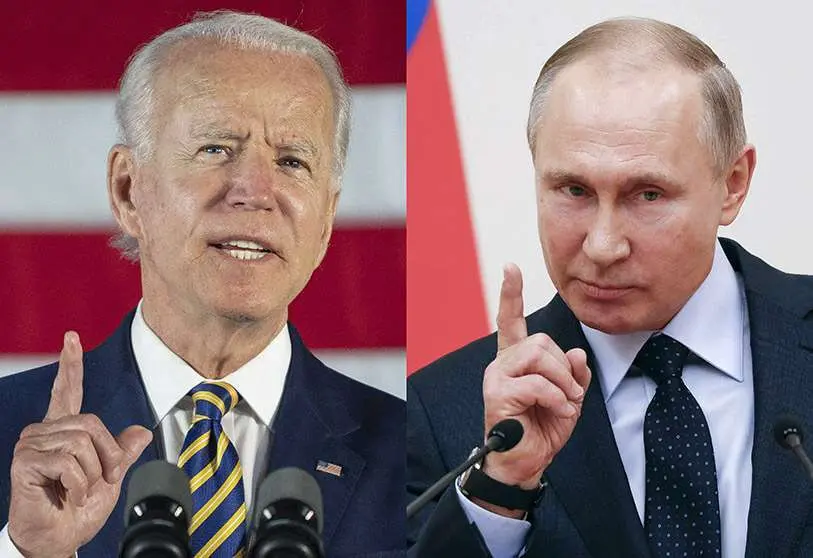Americans and Russians

The truth is that Putin does not like Biden and, according to US intelligence agencies, interfered in the last election to try to favour Donald Trump, and Biden does not like Putin either. When Biden met him in 2011, he told him to his face that he thought he was a man "without a soul". Now they will meet in Geneva with no reason to change each other's opinion of the other, so it is best not to expect too much from the meeting. This is called lowering expectations.
It is in Putin's interest to meet with Biden because American and European sanctions after annexing Crimea are damaging the country's battered economy, which was never very buoyant and is now also suffering - like all economies - from the effects of the pandemic. Putin knows that nobody is going to lift them (at least for the moment) but he would consider it a victory if he managed to soften them to some extent. Moreover, for a nationalist leader like Putin, the mere fact of meeting bilaterally, face to face, with the president of the most powerful country in the world is already a success in itself, regardless of the results of the meeting. Putin considers the demise of the Union of Soviet Socialist Republics, which downgraded Russia's international status to that of a second-tier power, a tragedy, and then Obama's comment that Russia is merely a "regional power" was a firebrand for him. He will never forgive this, which is why these bilateral summits, which allow the world to see him as he sees himself, on a par with Biden, are so valuable to him.
As for Biden, what really concerns him is not Russia but the rise of China, a country whose economy will soon pass that of the US, which is investing heavily in armaments, which advocates an alternative authoritarian model of global governance that is widely accepted by some countries, which uses questionable trade and monetary practices, and which threatens undisguised expansionism into the South China Sea and the Republic of Taiwan itself, after gobbling up Hong Kong without hearing more than mild protests from the world. And a rapprochement with Russia - or at least a predictable 'modus vivendi' - would not only leave Biden's hands lighter in dealing with China, it would also reassure Europeans and might encourage them to pay more attention to Asia and take a tougher stance on Beijing and its human rights violations. If the US were to achieve the latter, it could consider its president's current European tour a success.
All this being true, Biden is an old school man, who grew up and was politically trained in times of communism, the Cold War and "mutually assured destruction" and who harbours undisguised animosity for Russia. Unlike Obama, he does not talk of resetting the counter with Moscow, but neither does he want to risk escalation. The two countries have several disputes: the annexation of Crimea and the destabilisation of Ukraine, interference in US elections, parallel Russian accusations of American interference in their domestic affairs, human rights (Navalny), reciprocal expulsions of diplomats and the closure of consulates, the Kremlin's support for the Belarusian dictator who diverts planes to detain political opponents, cyber-terrorism, disinformation and Moscow's efforts around the world not only to discredit the Americans and their policies but also to drive wedges into the relationship between Brussels and Washington.
Despite these obvious differences, there is one thing that both agree on as it suits both the United States and Russia, which is to provide a certain stability and predictability to their bilateral relationship in order to avoid surprises as far as possible. When nuclear weapons are available, it is better to avoid risks; both parties know they should not play with fire, and they also know that there are matters on which they should understand each other's mutual and general interests, for instance, regarding disarmament. Once a five-year extension of START I (Strategic Arms Reduction Treaty) has been agreed, the possibility of further reductions in the respective arsenals, which are still very high and expensive to keep up to date, can be put on the table, the problem of how to incorporate China into disarmament efforts, or other treaties recently denounced by some, such as the The Intermediate-Range Nuclear Forces Treaty, or INF Treaty in Europe or the Open Skies Treaty. Disarmament is the most obvious area of possible short-term mutually beneficial collaboration. As is the fight against climate change (which has a major impact on the Arctic) or pandemics, where there is ample room for cooperation. These are issues of mutual interest. Just as they could also work together on nuclear proliferation issues such as those raised by Iran and North Korea.
After all, even if Russia no longer qualifies for the Champions League - however hard it tries - it still has a good team to respect, and if there is one thing that Washington fears much more than China - the possibility of Moscow and Beijing getting closer and doing a "Nixon" on it, reminiscent of what Nixon and Kissinger did to Brezhnev in 1972 with the cooperation of Mao Zedong and Chu En-Lai. Recently, Russia and China have been moving closer together. In the Americans' favour is Putin's nationalist character, who can hardly accept to be the junior partner in this eventual - but not at all impossible - alliance.
Jorge Dezcallar Ambassador of Spain

